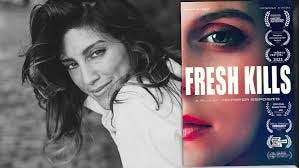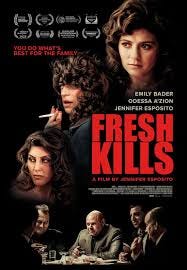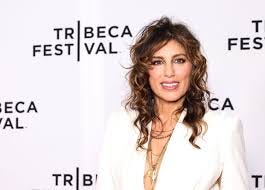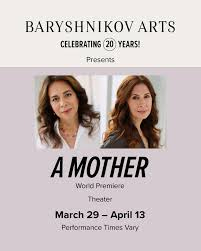"If I Were Still Waiting for Permission, I'd Still Be Waiting."
Writer-director Jennifer Esposito on making Fresh Kills, her gorgeous tale of mob wives and daughters
The other night, alone in a hotel room, I rewatched the first forty minutes of The Godfather. It was masterful, of course. But after having recently seen Jennifer Esposito’s film Fresh Kills, it struck me just how much this is a movie about men. By men, for men. Defining and shedding light on the codes of loyalty and behavior that men adhere to. It made me love Fresh Kills even more.
Fresh Kills is a mob movie like you’ve never seen—one that focuses on the women, the wives and daughters usually on the sidelines.
“We’ve never seen it, we’ve never heard about it,” says Esposito. Whereas in a conventional (that is, any other) mobster film, we’re tracking the men, here we are watching and feeling along with the women who surround them—the wives, daughters, and sisters whose lives are impacted and often upended.
Esposito says, “The movie is about finding a voice in a world that tells you not to have one.”


I loved her film and was so excited to meet Jennifer, who was, like me, a first-time filmmaker. We started off talking about the way in which each of us had changed lanes, Esposito from actor to filmmaker in order to make this first feature.
JE: I always felt like LA was more of the business and the scene and the glamor and the stars…. And in New York, there was an artist thing that really was very strong, and I was always in this middle ground of being pushed to be something I was not.
BB: Writers go through that too. When I lived in LA, my agents wanted me to write a five-act dramatic pilot with a murder in the suburbs, or a great big Legally Blonde “studio movie,” and neither of those are what I do. And I tried. I really tried. But in the end, I write small moves about complex people connecting and disconnecting.
JE: And that's the thing. That's an interesting conversation. I'm writing something now, and it's really all about the conditioning that we have as women, which is always to appease, to please, to make things nice for everyone.
BB: Well, sure. Because if you think about it, the men who disrupt are called “brave,” and everyone wants to work with them, and the women who disrupt are called “difficult” and “crazy” and kept out of the room.
JE: Honestly, that's what happened with Fresh Kills. Because I disrupted a very masculine genre. And I was looked at as this actress. One review, the headline was Best Mafia Film in Decades. But in the review, the writer referred to me as this actress three times! He said he came in with low expectations!
BB: I thought your movie was amazing.
JE: Thank you. But every step of the way, it was hard to get people on board. They had a perception of who I was, and they didn't want to read it. Then when I made it, and it was good and getting crazy reviews, and it really felt like what we were talking about before, the disruption of a genre. And the fact that I made it completely outside the system, on my own…it was like, we can't have her disrupt this so much. I do believe if I were a man and I’d made this movie, it would be a different thing. I do believe that.
BB: You premiered at Tribeca Film Festival and had a pretty great festival run. I remember you played at Bentonville when we had our world premiere, and we couldn’t see Fresh Kills because it was sold out. What happened once you got distribution and released the film?
JE: We released in June of last year. It took about a year to get distribution, and when we did, it was with a very small company. And they basically said, we have no money for anything. They wanted to release in one theater on each coast. And then, through one of the producers, we found our way to AMC and said, “Don't you don't you want to put this film in your movie theater?” So we wound up opening in thirty-six theaters, and we were growing! It could have gone higher, but the distributor said we're not giving money to this, we're just going to put you on Prime.
Another thing most people don't understand, and something I'd like to really make people who are planning to go in this direction think about is, marketing. We did a lot ourselves. I don’t know if you saw my social media, but I was making videos, doing anything and everything to get the word out. It was a lot.
BB: And what do you think worked?
JE: Organic engagement. Being very honest with people about the fact that we have no money and really need people to support the film.
I do believe there needs to be an upheaval with distribution and marketing. It's a bigger issue. And it's not just my film, it's a bigger issue. [When distribution has been narrowed down to only one or two buyers] you're just getting one perspective from the one person that's buying the content. If you want other voices, you need to support independent filmmakers. And it is not an easy thing to do.
I'm not only advocating for this because of my film. I'm doing it because I'm also a viewer, and I want to see other things. I want to see stories that make me think about different cultures, and we're not getting that.
BB: Let’s talk about your transition to directing. When did you start wanting to do that?
JE: You know, I really think I was doing it my entire life, in my mind, without knowing what I was doing. When I was hired as an actor, I was always looking at the camera: why is the camera there? And asking myself questions more than I realize is the actor's job. I had a manager early on say to me, “You're a director, you're talking like a director,” and I just really put it aside. But as an actor, I never really got to the things that I really craved, like to really create. And I got to the point where I was like, I can't do this anymore because of my soul. It was killing my soul. I needed to do something that I knew that I was capable of, and I always had this story in my head.
At some point, you have to stop complaining that no one's coming. An agent isn't coming. No one's knocking on your door to give you the best job. It's not happening. Put it out of your mind. So what are you going to do? If you think you can do it, do it. I knew I had to do it.
BB: And how long did it take you?
JE: It was on and off for years. I wrote, even if it was just two pages or five pages a day, and I researched camera angles. I like to joke that Barry Jenkins was my mentor because I watched Moonlight so many times. I studied the script. I read anything I could find about which camera angles he used and why. Why he shot the way he did. I took every single morsel in.
BB: And then what about setting the film up?
JE: I pitched Fresh Kills at a big streamer (a big big streamer!) and the executive said to me, “This is one of the best pitches I've had, and I love this so much. But I can't give you the money.” And I was like, why? She said, “Because you're a first-time writer.” And at the time, I had a man who wanted to direct the film—I didn't think that I was directing this yet—and this executive said, “Jennifer, do not let anybody else touch this. This is your film. You must make it.”
BB: And you did!
JE: But I had to stop waiting for permission. If I were still waiting for permission, I’d still be waiting!
You can watch Fresh Kills on Hulu and assorted other platforms including Prime. Stream it tonight and let me know what you think in the comments!
BONUS: If you are in New York, my excellent friend Neena Beber has a play running at the Baryshnikov Arts Center in Manhattan. A Mother, featuring Jessica Hecht, an actor I worship and have always wanted to work with.
A MOTHER: disco, water ballet, chicken soup, and Brecht. With Jessica Hecht and Fergie L. Philippe. Discount code MOTHERFAM20. Tickets at Baryhsnikovarts.org. (limited run must close April 13th)
See it and report back, right here in the comments!
As always, I wish you the best in your creative endeavors and midlife re-dreaming,
Brooke
PS: What did you think of the Times article on Gen X and our work-life meltdown?






